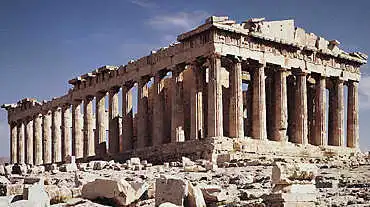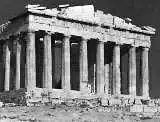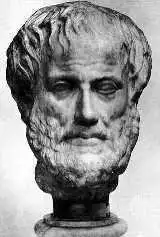Cosmos of the Ancients The Greek Philosophers on Myth and CosmologyTheagenes restling with the same unwillingness to accept that illustrious gang of gods in the works of Homer and Hesiod, Theagenes of Rhegium, also in the 6th century BC (flourished around 525 BC), was the first to find an allegorical way of reading the myths, where they were to be understood as expressions of natural forces. The battles of the gods, as Homer described them, were really wars of the elements and fundamental qualities of the world, as they related to one another in opposites fire against water, hot against cold, light against heavy.
restling with the same unwillingness to accept that illustrious gang of gods in the works of Homer and Hesiod, Theagenes of Rhegium, also in the 6th century BC (flourished around 525 BC), was the first to find an allegorical way of reading the myths, where they were to be understood as expressions of natural forces. The battles of the gods, as Homer described them, were really wars of the elements and fundamental qualities of the world, as they related to one another in opposites fire against water, hot against cold, light against heavy.
In this menagerie, fire was represented by Apollo, Helios and Hephaestus, water by Poseidon and Scamander, air by Hera, and so forth. Also abstract qualities had divine representation wisdom with Athene, desire with Aphrodite, reason with Hermes and folly, no less, with Ares. For gods to actually do battle, in the way Homer has it, would be unbecoming to them. No writing of his own remains, nor any fragments of his words.
LiteratureFreeman, Kathleen, The Pre-Socratic Philosophers, Oxford 1946.
© Stefan Stenudd 2000

The Greek Philosophers
AristotleIntroductionAristotle's LifeTimelineAristotle's PoeticsAristotle's CosmologyAbout CookiesMy Other WebsitesCREATION MYTHSMyths in general and myths of creation in particular.
TAOISMThe wisdom of Taoism and the Tao Te Ching, its ancient source.
LIFE ENERGYAn encyclopedia of life energy concepts around the world.
QI ENERGY EXERCISESQi (also spelled chi or ki) explained, with exercises to increase it.
I CHINGThe ancient Chinese system of divination and free online reading.
TAROTTarot card meanings in divination and a free online spread.
ASTROLOGYThe complete horoscope chart and how to read it.
MY AMAZON PAGE
MY YOUTUBE AIKIDO
MY YOUTUBE ART
MY FACEBOOK
MY INSTAGRAM
STENUDD PÅ SVENSKA
|
 Cosmos of the Ancients
Cosmos of the Ancients